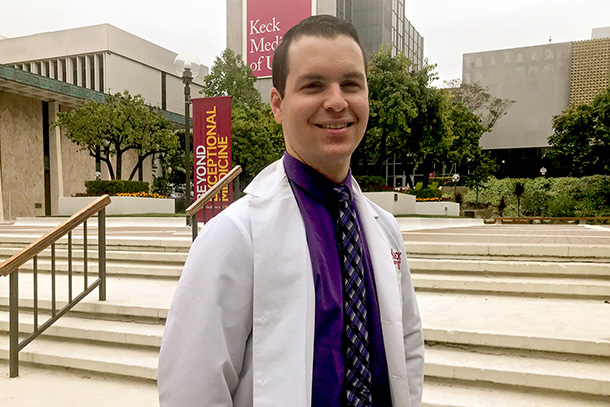Jonathan Tucci was uncertain whether he wanted to pursue a medical degree or a PhD. Fortunately, he found a way to do both.
“I like the idea of being a translational scientist — being able to go from bench to bedside, and back to bench to study the whole problem,” said Jonathan Tucci, a student in the USC-Caltech MD-PhD program at the Keck School of Medicine of USC.
When his studies are completed, Tucci will graduate with a medical degree from the Keck School of Medicine and a PhD from USC or Caltech.
USC-Caltech MD-PhD Program: a long-term commitment
Tucci, a California native who completed his undergraduate studies at the University of California, Irvine, said the program, while rewarding, requires a long-term commitment.
“It takes eight to 10 years — four years or more to do your PhD and four years of medical school,” he said.
Typically, students in the program will complete their first two years of medical school and step one of their medical licensing exams. Then they spend at least four years doing lab research before returning to medical school for the final two “clinical” years when they work with patients at Los Angeles County+USC Medical Center or a nearby clinic.
“That’s the tricky part: You get to know everyone in med school for two years, then you cut off ties to go do lab research for four or five years,” said Tucci, who recently completed his third year of medical school. “Then you come back, having not done anything with patients for four years. But it comes back quickly on the job.”
PhD research on kids with leukemia
Tucci’s PhD research focused on understanding why obese children with leukemia have worse treatment outcomes. His project initially studied this finding in the lab, modeling the interactions between leukemia and fat cells. From there, Tucci became co-investigator on a clinical trial at Children’s Hospital Los Angeles that aims to assess whether simple diet and exercise can improve chemotherapy efficacy in children with leukemia.
Tucci actually stayed an extra year in in the lab, doing postdoctoral research after his project was awarded a grant from the National Institutes of Health in what would have been his final year. He said the university left that decision up to him.
“I asked around campus and at CHLA for advice. It wasn’t an obvious choice. But USC let me make the call,” he said.
The principal investigator on the leukemia project was moving on, so he decided to stay and help with the transition.
And baby makes three
During his postdoctoral year, Tucci added another major project: He and his wife had a baby, an experience Tucci said changed him quickly.
“I matured a lot,” he said. “I got to look at life as a whole, from another level — I saw that certain things are more important. And seeing what my wife went through, I developed even more respect for female medical students who have children. It’s like superhero stuff. For me, instead of becoming a father during my third year of med school, I had an easier time as a postdoc researcher.”
The program also routes returning PhD students back into their clinical work at an outpatient clinic, rather than straight from the lab to 28-hour shifts at LAC+USC.
Tucci has worked at a private internal medicine practice in Burbank and has also done pediatric work at CHLA. He said a children’s hospital was a good place for a new parent.
“On a pediatric rotation, I not only got to understand the kids better, but I got to understand their parents — in pediatrics, working with parents is half the battle.”
What happens after graduation?
When he graduates, Tucci said he has decided the best place to bring his mix of research and clinical education and experience is in pathology — studying blood samples and surgical specimens to help physicians diagnose patients.
Pathology allows Tucci to take the expertise he learned in the lab and apply it toward helping physicians help their patients.
“As much as it’s not working with patients,” he said, “pathology feels like making good use of my dual-degree background, because every specialty in the hospital relies on it.”
— Paul Boutin


